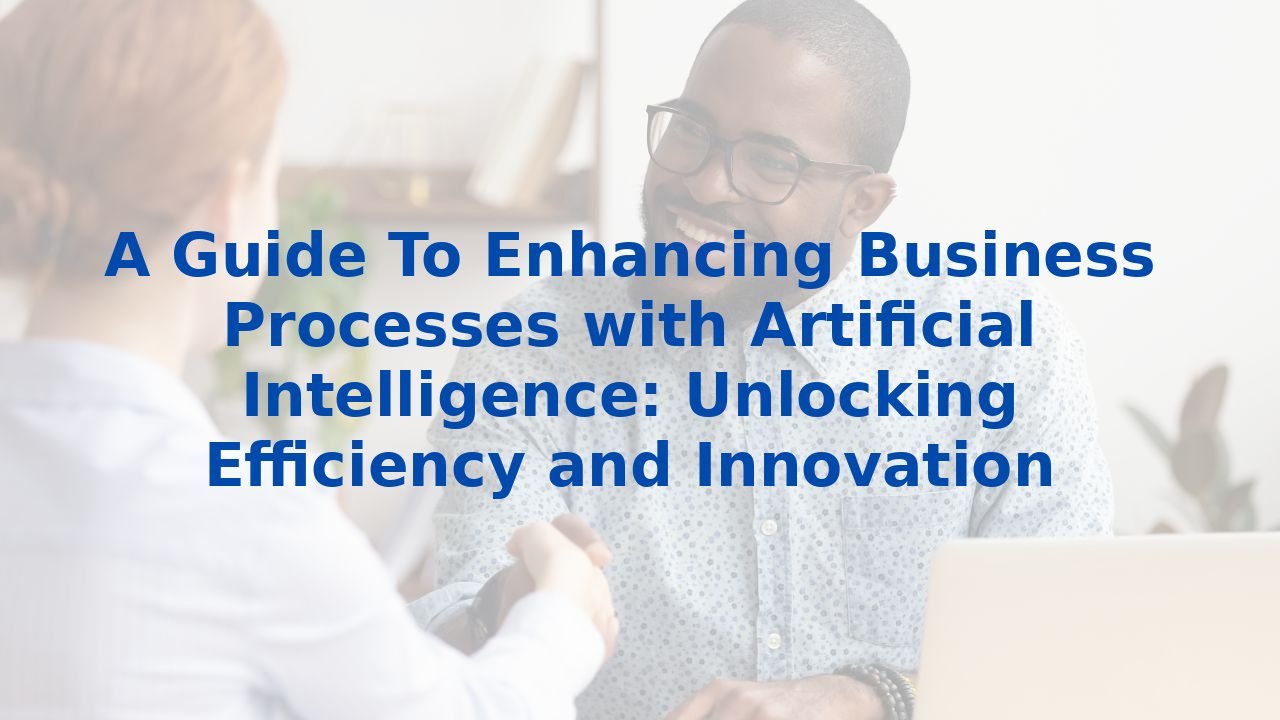A Guide To Enhancing Business Processes with Artificial Intelligence: Unlocking Efficiency and Innovation
A Guide To Enhancing Business Processes with Artificial Intelligence: Unlocking Efficiency and Innovation
In the relentless pursuit of operational excellence, organizations today find themselves at a pivotal crossroads. The landscape of business processes is evolving rapidly, ushered in by the transformative power of artificial intelligence (AI). This guide aims to demystify how AI can bolster efficiency and foster innovation across various business functions.
1. Improving Meetings
Meetings, though essential, often spiral into a tangle of administrative chaos. It’s all too common for critical discussions to dissipate under the weight of scheduling mishaps and note-taking burdens. Enter AI: voice assistants are now capable of scheduling appointments, while AI-driven tools can capture the essence of meetings, summarizing discussions and extracting actionable insights. This transition not only truncates tedious tasks but rejuvenates team dynamics, allowing your workforce to channel their energies toward mission-critical objectives.
2. Enhancing Sales and Marketing
The merger of sales and marketing with AI-driven analytics opens gates to unprecedented insights. AI can dissect complex datasets to identify high-potential customer segments, steering salespeople toward leads that promise higher revenue. Furthermore, the integration of AI tools like chatbots empowers companies to deliver personalized customer experiences in real time, championing efficient engagement and solidifying brand loyalty.
3. Assessing and Improving Customer Service
In a world where customer expectations soar, AI stands as a stalwart ally in enhancing service quality. By automating assessments of customer interactions, AI tools identify weaknesses in service processes, ensuring your team meets and exceeds consumer expectations. This relentless push for improvement not only enhances customer satisfaction but fortifies a brand's reputation as a responsive and reliable entity.
4. Improving Product Development Processes
The journey from concept to market doesn’t have to be arduous. AI revitalizes product development through generative design techniques, analyzing parameters and swiftly generating viable models that would have required extensive resources and time through traditional methods. By avoiding extraneous prototyping, organizations fast-track innovation while keeping operational costs in check.
5. Automating Content Generation
The realm of content creation has been revolutionized. Organizations can now harness AI to produce a diverse range of written material in mere minutes—be it product descriptions, blog posts, or detailed reports. This substantial leap not only mitigates creative fatigue but allows teams to focus on deeper strategic initiatives that drive growth.
6. Optimizing Business Processes
AI process optimization stands at the intersection of technology and management. By automating routine tasks and employing predictive analytics, organizations can streamline workflows, elevating productivity to new heights. Intelligent document processing, for instance, transforms how data is handled—turning documents into actionable insights with minimal manual intervention, thus curtailing errors and enhancing efficiency.
7. Enhancing Decision-Making
In the information age, decisive action stems from curated data. AI empowers decision-makers by delivering predictive insights based on comprehensive data analysis. This allows for informed discussions, from pricing strategies to resource allocation, unlocking a clearer path forward that avoids costly missteps.
8. Real-Time Monitoring and Process Mining
Imagine having the capability to observe business processes as they unfold. AI enables real-time monitoring, providing organizations with real-time data to detect inefficiencies instantaneously. By leveraging process mining tools, companies can glean actionable insights into their operations, ensuring they continuously optimize and innovate.
9. Automating Administrative Tasks
The realm of administrative duties need not be a bottleneck. AI efficiently manages tasks such as document processing and data entry, significantly diminishing the burden on human resources. This automation not only liberates individuals from mundane tasks but reshapes team dynamics, enabling them to engage in more meaningful work.
10. Enhancing User Experience
AI-driven advancements have made business process management more intuitive than ever. Enhanced user interfaces allow employees at all levels of technical ability to manage operations fluidly. By reducing complexity, AI fosters an environment where teams can innovate rather than merely survive.
The Benefits of Training Employees for AI
While AI's profound impact on business processes is undeniable, the importance of training your workforce to navigate these new tools cannot be overstated. As organizations pivot to embrace AI, equipping employees with the requisite skills becomes paramount:
- Adaptability: Well-trained employees can seamlessly integrate new tools into their workflows, minimizing disruption.
- Efficiency: Understanding AI concepts enables employees to leverage technology effectively, optimizing productivity.
- Better Decision-Making: Employees equipped with AI insights can make informed choices that drive organizational success.
- Proactive Problem-Solving: Familiarity with AI tools empowers employees to tackle issues rapidly, leveraging data-driven insights.
In summary, AI presents a compelling opportunity to enhance business processes and foster a culture of efficiency and innovation. By embracing these technologies—and investing in employee training—we can unlock untapped potential, setting the stage for a future where operational excellence isn’t just a goal but a way of life.



